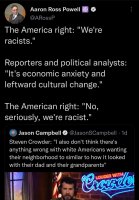That'll do the trick
University of Illinois Chicago wants to cancel 'racist' word 'obesity'
The University of Illinois Chicago’s school of public health
published an article by a dietitian claiming the medical term is “racist” and should be replaced with the wordy term “people with larger bodies.”
the actual publication is a hoot
"Focusing on weight ignores systemic injustices
Though lifestyle factors such as nutrition and exercise are important, it is essential to note the historical racism and injustices within our current food environment. As presented by Soul Fire Farm33, the U.S. food system is built on stolen land usingstolen labor from Black and Latinx indigenous people. Not only has this created a large scale food apartheid and trauma forpeople indigenous to this land, it has caused a disconnection of indigenous people from their cultural practices and identities."
Yes, your individual health if obese may benefit from better diet and exercise but it will really improve if you only recognize the historical racism and injustices with our current food environment and remember back in the good ole days being fat was a sign of wealth so being fat is really better for you.
"Around 81 percent of societies historically have favored people in larger bodies5. Larger bodies signified wealth and prosperity while thinness signified poverty andweakness. However, this began to change due to racism and eugenics. Charles Darwin and other race scientists created a hierarchy of civilization, placing whitemen on top and people of color, specifically black people, at the bottom, considering them to be “less civilized.” Fatness and differing body characteristics wereused to justify lack of civilization: fatness used as a marker of “uncivilized behavior” while thinness was “more evolved”. This idea was maintained throughoutthe United States in the 19th and 20th centuries, as a way to justify slavery, racism and classism, and control women through “temperance”. This ideology hasperpetuated Desirability Politics- where thinness and whiteness are given more access to social, political and cultural capital6,7."



